

2 Ontario residents charged in Edmonton extortion investigation. Police in Edmonton have charged two people from Ontario with extortion after a local man was allegedly threatened through a text messaging app.

The Edmonton Police Service received a report in February that an Edmonton man was receiving threatening text messages from an unknown third party. The messages demanded money and threatened the man’s life if he didn’t pay up, police said in a media release Friday. Pictures of a firearm were also sent to the man. The messages also suggested the sender knew the man’s home address, police said. The EPS Cyber Crime Investigations Unit traced the messages and on March 19, Edmonton officers searched an address in Ancaster, Ont., with the assistance of the Hamilton Police Service. “Criminals think the distance and perceived anonymity of this type of crime will protect them, but despite their attempts to use technology to mask their location, we are still able to identify them and lay charges,” Det. Story continues below advertisement.
Cobourg woman accused of harassment via social media - Peterborough. Case Study: How a notorious spammer was brought down via Twitter. Today the Montreal Police announced that an arrest has been made (in French here) in the “Mabus” case. It wouldn’t have happened but for Twitter. This post explains how. Twitter has been around for five years now, but there is still much confusion about what it is good for. How can you post anything useful in 140 characters?
Isn’t it just people posting what they had for lunch? And yet there are several thousand self-proclaimed skeptics actively using Twitter quite effectively as a means of communication and organization. I think the sequence of events of how this came together are quite interesting, and perhaps an object lesson in online activism. Setting the Stage. Dennis Markuze threatening to kill PZ Myers - Skeptic Friends Network. David Mabus is very well known, and has posted both as a member and then as a banned sockpuppet here at SFN.

And yes, he is unhinged. A couple of years ago, he was issuing death threats against James Randi for cheating him out of a prize that he never even entered to win. The RCMP and Montreal police ignored cybercrime while demanding new powers to fight cybercrime. Canadian cops claim they need new “lawful access” laws to deal with online crime.
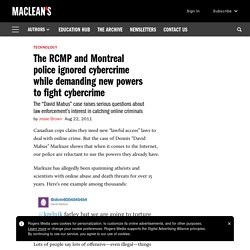
But the case of Dennis “David Mabus” Markuze shows that when it comes to the Internet, our police are reluctant to use the powers they already have. Markuze has allegedly been spamming atheists and scientists with online abuse and death threats for over 15 years. 2018 ABPC 264 (CanLII) Reasons for Sentence of the Honourable Judge A.A.
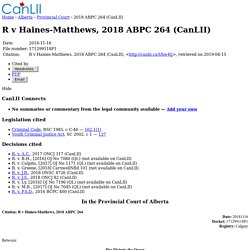
2018 ONSC 4726 (CanLII) CITATION: R. v.
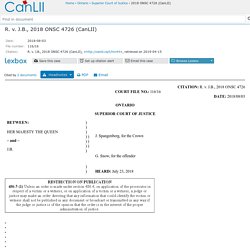
J.B., 2018 ONSC 4726 LEACH j. Trolls and tribulations: One-in-four Canadians say they’re being harassed on social media. Most say companies don’t do enough to combat abuse on social media platforms October 21, 2016 – It’s not something most people would feel comfortable seeing while walking down the street: One out of every four people being subjected to unwelcome comments, vicious insults, threats of violence, or worse.

On Facebook or Twitter, however, this is exactly the environment that develops below even the most run-of-the-mill political stories. Internet troll. Person who sows discord on the Internet In Internet slang, a troll is a person who starts quarrels or upsets people on the Internet to distract and sow discord by posting inflammatory and digressive,[1] extraneous, or off-topic messages in an online community (such as a newsgroup, forum, chat room, or blog) with the intent of provoking readers into displaying emotional responses[2] and normalizing tangential discussion,[3] whether for the troll's amusement or a specific gain.

Usage The advice to ignore rather than engage with a troll is sometimes phrased as "Please do not feed the trolls. " Application of the term troll is subjective. 'Not just words': Online harassment of women an 'epidemic' 9: Impersonation - 10 Forms of Online Harassment. No, I'm not talking about Elvis here, although it's safe to say that this most popular of impersonation icons has more than a few false social media accounts in his name.
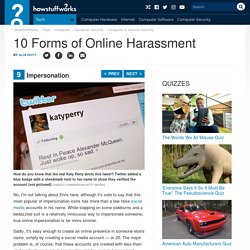
While slapping on some sideburns and a bedazzled suit is a relatively innocuous way to impersonate someone, true online impersonation is far more sinister. Sadly, it's easy enough to create an online presence in someone else's name, simply by creating a social media account — or 20. The major problem is, of course, that these accounts are created with less-than-stellar intentions in mind, leaving the violator open to harassment claims when they Photoshop nude photos, brag about rampant drug use or otherwise inaccurately depict the person they're pretending to be.
The Twitterverse is rife with such accounts, particularly among celebrities. - The Washington Post. Reddit apologises for online Boston 'witch hunt' Social news site Reddit has issued a public apology for its coverage of the Boston bombings.
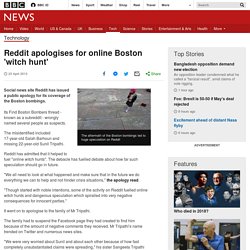
Its Find Boston Bombers thread - known as a subreddit - wrongly named several people as suspects.